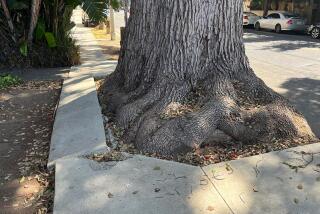Time to Get Busy on Infrastructure
- Share via
It’s 11:30 a.m. Richard, a veteran Orange County teacher--exhausted, but still committed--lines up his third-graders and leads them across campus to the school’s one working lavatory. As the line threads through the crumbling halls, Richard and his students are suddenly plunged into darkness.
Richard sighs. The kids laugh and shrug. Just another rolling blackout.
Richard’s wife, Lydia, works 26 miles from the couple’s home, but usually spends more than three hours each day commuting on the impossibly crowded highways between her office and her house.
Richard and Lydia’s son, Paul, a lifeguard at a popular beach, has the sad responsibility of ensuring that none of the thousands of beachgoers venture anywhere near the water because of contamination.
This fictional family’s story is a dramatic example of what happens when we do not invest in or pay attention to our infrastructure. Every day, such nitty-gritty nuts-and-bolts issues affect the millions of Orange County residents who use our school facilities, drink and swim in our water, drive our highways, and use our parks and airports.
Critical infrastructure systems and facilities are fast approaching the end of their useful lives in many regions of California.
Unfortunately, Orange County is no exception. Its population continues to grow, putting increasing pressure on an aging infrastructure that is struggling to keep up, and more frequently failing in the effort.
Shortfalls in federal and state funding have placed a tremendous burden on these aging systems. Another key factor, however, is that Orange County residents consistently pay more in federal taxes than the federal government returns to Orange County. Simply put, we are a donor county in a donor state.
For the past several years this deficit has averaged more than $28 billion per year, statewide, with Orange County’s loss, in highway funds alone, about $68 million last year.
In contrast, states such as Alabama have congressional delegations that understand the importance of infrastructure projects, and federal funding in that state is at a surplus of more than $11 billion.
Some months ago, a group of concerned people who place great value on the quality of life in Orange County began meeting to determine what it will take to turn this situation around.
As a first step, the UC Irvine Civil and Environmental Engineering Affiliates teamed with the American Society of Civil Engineers and many other groups to take on the task of assessing the condition, capacity and operations of Orange County’s infrastructure.
Months of research, evaluation and data analysis by these professionals, drawn from both the public and private sectors, will soon culminate in the Orange County Infrastructure Report Card. The report card, to be released Thursday by the UCI Department of Civil and Environmental Engineering Affiliates, will focus on eight areas: aviation, transportation, schools, water supply, waste water, solid waste, parks and recreation, and urban runoff/flood control.
Though the report card will give us an idea of how to proceed, ultimately it remains for Orange County residents themselves to take the next steps toward restoring and improving our infrastructure. We need to express our concerns to public officials at all levels of government. We need to support local, state and federal officials who understand and are committed to infrastructure renewal.
Infrastructure should be an election issue, just like education, crime and health care. We must also ensure passage of local bond issues to repair, replace, and expand our transportation and water systems as well as our schools and recreational facilities. Our neighbors, governor and elected representatives in Sacramento and Washington need to hear from us.
The old joke about the human organs bickering about “who’s the king of the human body” is very appropriate--the “king” turns out to be the organ we least like to talk about, because if it doesn’t function perfectly, it gums up the whole works!
What is true for the human body holds equally for the body politic. So if we wish to continue with the so-called higher activities of human concern, we must immediately begin to pay attention to issues like waste water treatment and sewer systems.
It seems obvious that these issues of basic, essential urban services that are required for all human activities go beyond political party, ethnic identity or socioeconomic position. These common (in all senses of the word) issues should unify us as neighbors and spur us to establish effective coalitions that can develop, articulate and advance coherent plans to renew the concrete foundations of our life together. As “unsexy” as that sounds, it all boils down to infrastructure.
*
Sarah L. Catz is with the Center for Urban Infrastructure at the UC Irvine Institute of Transportation Studies.
More to Read
Sign up for Essential California
The most important California stories and recommendations in your inbox every morning.
You may occasionally receive promotional content from the Los Angeles Times.










